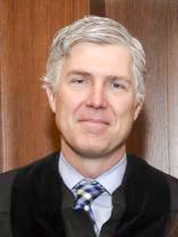Supreme Court
The Power of the Purse
House Democrats have power to use appropriations process to stop Trump Administration environmental rollbacks
Dan has already posted about some of the big deregulatory steps the Trump Administration is likely to take in the next year. But the new Democratic majority in the House could have something to say about those steps, if they wanted to. Democrats will have even more leverage over spending bills than they had in …
Continue reading “The Power of the Purse”
CONTINUE READINGTwo Years and Counting: Looking Forward
What’s the prognosis for the second half of Trump’s term?
In terms of regulatory policy, the second half of Trump’s term is shaping up to look a lot like Obama’s final two years in office. Congress won’t be doing much to advance Trump’s environment/energy agenda, as was the case with Obama. So, like Obama, Trump’s focus will be on administrative action, particularly regulatory initiatives (or …
Continue reading “Two Years and Counting: Looking Forward”
CONTINUE READINGSupreme Court Issues Narrow Decision in Dusky Gopher Frog Case, Leaving Key Questions About the Scope of Critical Habitat Unresolved for Now
Fifth Circuit Must Now Review Whether Designated Critical Habitat is “Habitat,” & Whether Agency’s Assessment of Costs and Benefits of Critical Habitat Designation Was Arbitrary
The U.S. Supreme Court filed its opinion in Weyerhaeuser v. U.S. Fish and WIldlife Service today. I’ve posted about this case previously here (when our clinic filed its brief on behalf of preeminent scientists) and here (on the day of the oral argument in the case). (Note that this blog post, like all my posts on this …
CONTINUE READINGThe Endangered Species Act in the Supreme Court: Oral Argument Today in Weyerhaeuser v. US Fish & Wildlife Service
Post-Argument Panel at Georgetown Law Will Feature Advocates
Oral argument in Weyerhaeuser v. U.S, Fish & Wildlife Service is this morning, the first day (and first argument) of the new Supreme Court term. The Court will be short-handed, with only eight Justices hearing the case. I’ll be attending the argument and speaking on a post-argument panel at Georgetown Law School, along with other advocates …
CONTINUE READINGWhat Kind of Conservative is Kavanaugh?
Half a dozen observations on our (probably) soon to be junior Justice.
I wanted to add a few words about Kavanaugh in light of Ann Carlson’s excellent post a few minutes ago. No doubt we’ll be seeing more about his views after people have had time to read his opinions and some of his law review writing. But there are a few points I would add after …
Continue reading “What Kind of Conservative is Kavanaugh?”
CONTINUE READINGUCLA Law Wells Environmental Law Clinic Files U.S. Supreme Court Brief on Behalf of Scientists in Endangered Species Act Case
Scientists’ Brief Argues Federal Agencies and Courts Must Use Science in Interpreting “Habitat” Under the Endangered Species Act; Clinic Clients Include Profs. Stuart Pimm & E.O. Wilson, Along With Three MacArthur “Genius” Award Recipients & Ten Other Esteemed Scientists
Congress enacted the Endangered Species Act in 1973 to protect species at risk of extinction. Congress viewed species extinction as an urgent threat requiring urgent, decisive action. The result was a bipartisan law designed to apply scientific knowledge and expertise to managing the threats to U.S. species. While the Act has been controversial, and characterized …
CONTINUE READINGWhen is unoccupied habitat “critical”?
The Supreme Court will hear a challenge to the critical habitat designation for the dusky gopher frog
Controversy and litigation have been pervasive since adoption of the Endangered Species Act in 1973, but the Supreme Court has been a relatively minor player in the law’s development. By my count, the Court so far has only addressed the substantive merits of an ESA claim three times (in TVA v Hill, 437 US 153 …
Continue reading “When is unoccupied habitat “critical”?”
CONTINUE READINGFencelines
The Supreme Court rules on how to define a parcel of property under the Constitution
The Supreme Court ruled today on Murr v. Wisconsin, a takings case that could have potentially had a major effect on land use regulation. The Supreme Court has ruled that a “taking” of private property exists if the state prohibits all economically beneficial use of property. Naturally, lawyers have gleefully litigated the question of how …
CONTINUE READINGGorsuch and the Environment: A Closer Look
Gorsuch doesn’t seem to have a strong agenda in this area, with several pro-environmental rulings.
What could we expect from Neil Gorsuch as a Supreme Court Justice in environmental and energy cases? After reading all the opinions I could find, I’d say the best news is this: He doesn’t seem to have any particular agenda in the area. That distinguishes him from some past appointees such as Clarence Thomas, who …
Continue reading “Gorsuch and the Environment: A Closer Look”
CONTINUE READINGPredicting How Neil Gorsuch Would Rule on Environmental Issues
If he’s ever confirmed by the U.S. Senate
Donald Trump just announced his nomination to replace Justice Antonin Scalia. Here are some very preliminary thoughts. Assuming Trump’s nominee, Neil Gorsuch, is confirmed by the U.S. Senate (by no means a certainty), what do we know about how he would be likely to rule on environmental questions? As far as I can tell, he …
Continue reading “Predicting How Neil Gorsuch Would Rule on Environmental Issues”
CONTINUE READING







